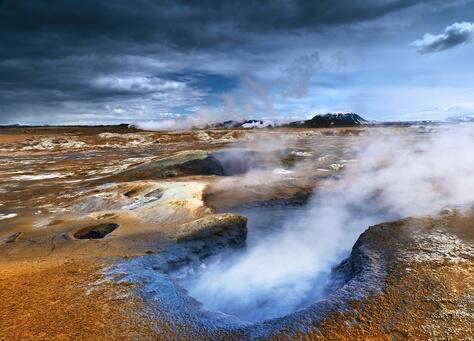Researchers from the UAE’s Masdar Institute are exploring the feasibility of utilising geothermal energy for zero-carbon seawater desalination.
The heat energy radiating from inside the earth is enormous and it has been a highly untapped and renewable energy source.
According to the Institute, it could only take a small fraction of the energy produced inside the earth to be tapped to meet all of the electricity demands without emitting any harmful gases into our atmosphere.
Masdar Institute has been conducting studies to know how economically and technically is this source of energy feasible for the UAE to be tapped and be used for producing freshwater from sea in a country which is a hot and barren desert. At present, intensive desalination processes produce fresh water in the UAE region.
Masdar Institute Chemical and Environmental Engineering professor Hassan Arafat said: “In the UAE, seawater desalination is one of the largest consumers of the country’s generated power.
“It is estimated that nearly 30% of the fuel consumed by the UAE’s cogeneration natural gas-fired power plants is used to produce freshwater.”
The water desalination process is also one of the biggest contributors of greenhouse gases. Every year roughly 65 million tonnes of greenhouses gases are emitted through combine power generation and water desalination activities.
Arafat continued: “Through a comprehensive process of design modeling and economic and technical evaluation, we determined that geothermal energy would be a reliable way to supply a steady output of freshwater at a much lower environmental cost.”
Desalination techniques are mainly of two types including reverse osmosis (RO) and multiple effect distillation (MED). While reverse osmosis uses water being pumped at high pressure through semi-permeable membranes which leave out dissolved salts, multiple effect distillation process involves boiling seawater and distilling fresh water.
The team from Masdar used both the techniques to study the levelised cost of water (LCOW) of producing fresh water and determined that using geothermal energy, the LCOW for RO is $2.06 per cubic meter of water and for MED, it was $2.48 per cubic meter.
At present, the cost of desalination in UAE powered by natural gas amounts to $1.4 for RO and for MED it is $1.6 per cubic meter of water.
Dr. Arafat said: “While not yet an economically viable alternative to conventionally powered RO desalination at current energy prices, these two geothermal-based schemes still show potential to be a cost-effective method of renewable desalination in the UAE.”
The feasibility study is also of importance because, UAE has been importing natural gas since 2008. The volatility of oil and gas prices in the international market also pose an issue to the desalination process.
The study found that the geothermal temperatures in the region ranged between 90° to 150° Celsius, which are relatively low and could be used for producing power instead of water desalination.











